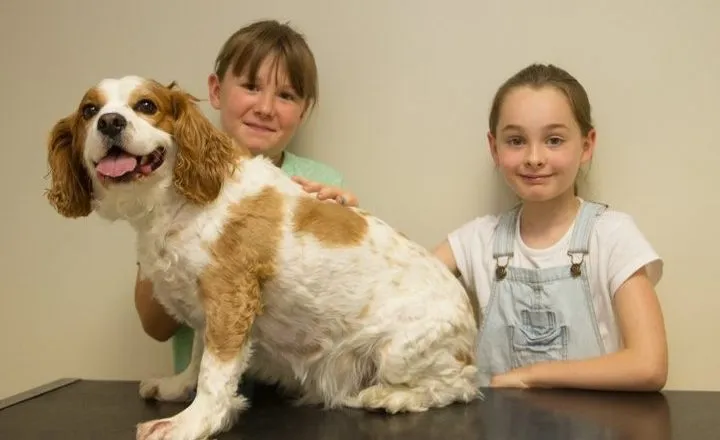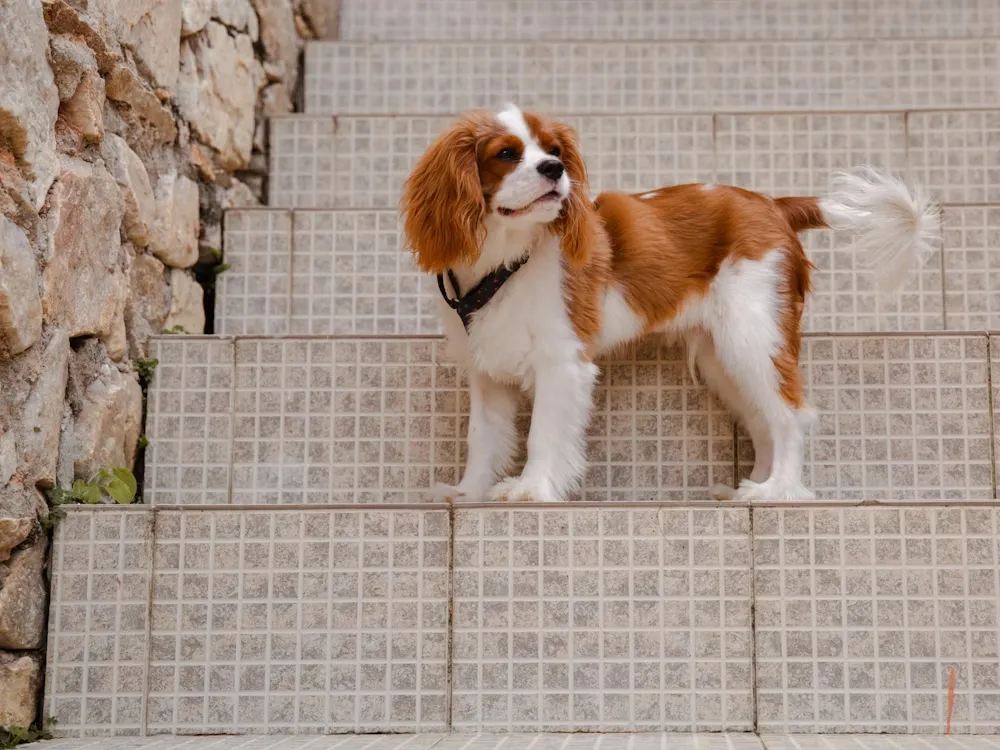Are Cavalier King Charles Spaniels good family dogs? Known for their gentle nature and affectionate demeanor, these charming canines have carved a niche as exceptional family companions. Their endearing qualities, including a friendly disposition and adaptability, make them well-suited for families of all sizes. Cavalier King Charles Spaniels thrives on human interaction and is particularly fond of children, displaying a patient and tolerant attitude.

Their affectionate nature extends to all family members, fostering strong bonds and a sense of togetherness. Furthermore, their manageable size and adaptable temperament make them an ideal fit for various living situations, from spacious homes to more compact environments. In this exploration, we delve into why Cavalier King Charles Spaniels are not only good family dogs but also bring a unique blend of warmth and companionship to households seeking a delightful canine addition.
Characteristics of Cavalier King Charles Spaniels:
Cavalier King Charles Spaniels are known for their distinct physical characteristics and charming appearance. These small dogs have a well-proportioned body with a silky, medium-length coat that comes in various colors, including Blenheim (chestnut and white), tricolor, black and tan, and ruby. Their expressive eyes, long ears, and sweet, gentle expressions make them instantly recognizable and utterly lovable.
Beyond their physical appearance, Cavalier King Charles Spaniels have several other notable characteristics. They are sturdy and compact dogs, with an average height of 12 to 13 inches and a weight ranging from 13 to 18 pounds. Despite their small size, they possess an elegant and confident gait that showcases their regal lineage.

These dogs have a friendly and affectionate disposition, which is another characteristic that sets them apart. They thrive on human companionship and form strong bonds with their families. Cavaliers have a natural ability to sense their owners' emotions and provide comfort when needed, making them excellent therapy dogs and emotional support animals.
The intelligence of Cavalier King Charles Spaniels is also worth mentioning. They are quick learners and respond well to positive reinforcement training methods. This intelligence, combined with their eagerness to please, makes them highly trainable dogs. Whether you want to teach them basic obedience commands or more advanced tricks, Cavaliers are up for the challenge and will enjoy the mental stimulation that training provides.
Temperament and Personality of Cavalier King Charles Spaniels
Cavalier King Charles Spaniels are renowned for their sweet and gentle temperament, which makes them ideal family dogs. They are naturally sociable and get along well with people of all ages, including children. This breed is known for being patient and tolerant, making them a great choice for families with young kids.
One of the standout qualities of the Cavaliers is their affectionate nature. They love to shower their owners with love and attention, often following them from room to room to be by their side. Cavaliers are known to be "velcro dogs" because they form strong bonds with their human family members and prefer to be near them.
Despite their affectionate nature, Cavaliers are not overly demanding or clingy. They are content to simply be near their loved ones, whether it's sitting on the couch together or going for a leisurely walk in the park. This laid-back attitude makes them adaptable to different lifestyles and ensures that they can fit seamlessly into a family dynamic.
Cavaliers are also known for their friendly and outgoing personalities. They have an innate ability to get along with other animals, making them a great choice for families with existing pets. Their sociability extends beyond their immediate family, as they are typically friendly with strangers as well. This makes them excellent candidates for therapy work or activities that involve interacting with new people.

Cavaliers as Family Dogs
Cavalier King Charles Spaniels have a long history of being cherished family pets, and for good reason. Their combination of affection, adaptability, and sociability makes them well-suited for families of all sizes and compositions. Whether you have young children, teenagers, or even elderly family members, Cavaliers can bring joy and companionship to everyone in the household.
One of the reasons Cavaliers excel as family dogs is their gentle and patient nature. They are known to be especially good with children, often tolerating their playful antics without becoming agitated or aggressive. Their small size also makes them less intimidating for young children, reducing the risk of accidental injuries during playtime.
Cavaliers are adaptable dogs that can easily adjust to the routines and dynamics of a busy household. They are happy to participate in family activities, whether it's going for walks, playing fetch in the backyard, or simply curling up on the couch for a movie night. Their moderate energy levels mean that they can match the activity level of the family without becoming overly hyper or restless.
Another benefit of having a Cavalier in a family is their ability to provide emotional support and companionship. These dogs are incredibly intuitive and have a knack for sensing when their owners are feeling down or stressed. They are always there to offer a comforting presence and provide a listening ear (or rather, a listening floppy ear).
Benefits of Having a Cavalier in a Family
There are numerous benefits to having a Cavalier King Charles Spaniel as part of your family. Here are just a few of the many advantages that these delightful dogs bring:
- Unconditional Love and Affection: Cavaliers are known for their unwavering love and loyalty towards their owners. They are always ready to offer a comforting presence and a wagging tail, providing emotional support to family members of all ages.
- Great with Children: Cavaliers have a gentle and patient nature, which makes them excellent companions for children. They are tolerant of the roughhousing and energy that often comes with young kids, making them a popular choice for families.
- Adaptable to Different Lifestyles: Whether you live in a small apartment or a spacious house, Cavaliers can adapt to various living conditions. Their moderate exercise needs and adaptable nature make them suitable for families with different lifestyles.
- Sociable and Friendly: Cavaliers are naturally sociable dogs and enjoy being around people. They are friendly with strangers and typically get along well with other animals, making them a joy to have in social settings.
- Therapy and Emotional Support: Cavaliers excel in therapy work and can provide emotional support to individuals of all ages. Their intuitive nature and gentle demeanor make them ideal candidates for providing comfort and companionship in various therapeutic settings.
Having a Cavalier King Charles Spaniel in your family can bring immeasurable joy and love. Their presence can brighten even the darkest of days and create lasting memories for everyone in the household.
Training and Socialization for Cavaliers
Training and socialization are crucial aspects of raising a well-behaved and balanced Cavalier King Charles Spaniel. While these dogs have a naturally friendly and sociable disposition, proper training and socialization can enhance their behavior and ensure they grow into well-rounded companions.
Cavaliers are intelligent dogs and respond well to positive reinforcement training methods. They thrive on praise, treats, and other rewards, making training sessions enjoyable for both the dog and the owner. Consistency and patience are key when training a Cavalier, as they can be sensitive to harsh or negative training methods.
Basic obedience training is essential for Cavaliers, as it helps establish a clear line of communication between the dog and its owner. Teaching commands such as sit, stay, come, and leave can be beneficial in everyday situations and ensure the safety of the dog. It's also important to teach them leash manners, as Cavaliers can be prone to pulling when excited.
Socialization is equally important for Cavaliers, as it helps them become comfortable and well-behaved in different environments and around various people and animals. Introduce your Cavalier to different sights, sounds, and experiences from a young age. This can include trips to the park, meeting new people, and exposure to other friendly dogs. Gradually exposing them to new situations will help prevent fear or anxiety-related behaviors as they grow older.
Health Considerations for Cavaliers
Like all dog breeds, Cavalier King Charles Spaniels are prone to certain health issues that potential owners should be aware of. While not all Cavaliers will experience these conditions, it's important to understand the potential health risks and take preventative measures to ensure the well-being of your furry companion.

One of the most common health concerns in Cavaliers is mitral valve disease (MVD), which affects the heart. MVD is a degenerative condition that causes the heart valves to weaken over time, leading to heart murmurs and other cardiac issues. Regular veterinary check-ups and screening for heart conditions are essential to catch any potential problems early on.
Another health condition that Cavaliers are prone to is syringomyelia, a neurological disorder that affects the brain and spinal cord. This condition can cause symptoms such as pain, scratching, and sensitivity to touch. If you notice any unusual behaviors or signs of discomfort in your Cavalier, it's important to consult with a veterinarian for a proper diagnosis and treatment plan.
Cavaliers are also susceptible to certain eye conditions, including cataracts and progressive retinal atrophy (PRA). Regular eye examinations can help detect any abnormalities early on and ensure appropriate treatment if necessary.
To minimize the risk of these and other health issues, it's important to choose a reputable breeder who conducts health testing on their breeding dogs. A responsible breeder will prioritize the health and well-being of their Cavaliers and provide you with a healthy puppy.
Finding a Cavalier King Charles Spaniel for Your Family
When it comes to finding a Cavalier King Charles Spaniel for your family, there are a few options to consider. The most common avenues for acquiring a Cavalier are through reputable breeders, rescue organizations, or adoption centers.
If you decide to go the breeder route, it's important to do thorough research and find a reputable breeder who prioritizes the health and well-being of their dogs. A responsible breeder will conduct health screenings on their breeding dogs, provide proper care for the puppies, and be knowledgeable about the breed.
Rescue organizations and adoption centers can also be great options for finding a Cavalier King Charles Spaniel. These organizations often have Cavaliers available for adoption, including adults and puppies. Adopting a rescue Cavalier can be a rewarding experience, as you are providing a loving home to a dog in need.
Whichever route you choose, it's important to spend time getting to know the breeder or rescue organization, asking questions, and ensuring that they are reputable and trustworthy. Visiting the facility or meeting the dog in person can give you a better sense of the dog's temperament and overall health.

Tips for Taking Care of a Cavalier King Charles Spaniel
Taking care of a Cavalier King Charles Spaniel involves providing them with the love, attention, and care they deserve. Here are a few tips to help you ensure your Cavalier's well-being:
- Regular Exercise: Cavaliers have moderate exercise needs and enjoy daily walks and playtime. Aim for at least 30 minutes to an hour of exercise each day to keep them physically and mentally stimulated.
- Grooming: Cavaliers have a medium-length coat that requires regular brushing to prevent matting and tangles. Additionally, they may need occasional trimming around the ears, paws, and tail. Regular nail trims, ear cleanings, and dental care are also important for their overall health.
- Proper Nutrition: Feed your Cavalier a balanced and nutritious diet that is appropriate for their age and activity level. Consult with your veterinarian to determine the best food options and feeding schedule for your dog.
- Regular Veterinary Check-ups: Schedule regular check-ups with your veterinarian to monitor your Cavalier's health and catch any potential issues early on. Vaccinations, parasite prevention, and dental cleanings should also be part of their routine healthcare.
- Socialization and Training: Continue socializing your Cavalier throughout their life to ensure they remain friendly and well-behaved in different environments. Ongoing training sessions can also help reinforce good behavior and provide mental stimulation.
Remember, Cavaliers are companion dogs and thrive on human interaction. Spend quality time with your Cavalier, provide them with plenty of love and attention, and you'll be rewarded with a loyal and devoted companion.
Conclusion:
Cavalier King Charles Spaniels undeniably stand out as exceptional family dogs. Are Cavalier King Charles Spaniels good family dogs? Absolutely. Their friendly and playful nature, coupled with remarkable adaptability and sociability, positions them as an ideal choice for families of all sizes and compositions. Cavaliers seamlessly integrate into the dynamics of a household, bringing not only joy and companionship but also a touch of elegance.
These charming canines forge strong bonds with all family members, displaying a patient and loving demeanor, especially towards children. In answering the question, it becomes clear that Cavalier King Charles Spaniels are not only good family dogs but also invaluable additions that contribute to the warmth and happiness of any home.
Whether you're looking for a dog that will get along well with children, provide emotional support, or simply be a loving companion, a Cavalier King Charles Spaniel can check all the boxes. Their affectionate nature, adaptability to different lifestyles, and gentle temperament make them a perfect fit for families seeking a loyal and loving furry friend.
If you're considering adding a Cavalier to your family, take the time to research reputable breeders or consider adopting from a rescue organization. By providing a loving and caring home, you can give a Cavalier King Charles Spaniel the life they deserve while enjoying the countless benefits that they bring to your family.




